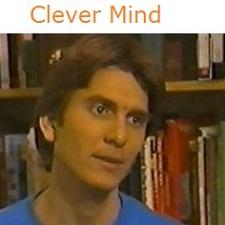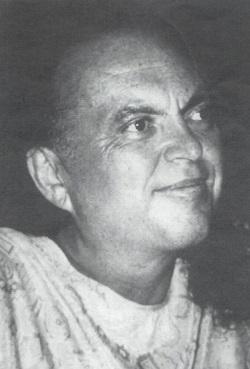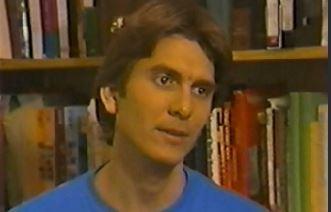
A Lesson
The following article was developed from a period of a consideration known as

Indoor Yajna – A Summary of Adi Da’s Teaching work (1972-1986) affirming all devotees were in the ‘listening‘ phase of practice.

![]() knowing mind is a closed mind. All those on a “spiritual path'” would do well to develop, understand, and exercise the discriminating capacity of their minds. Why? Because if this discriminative intelligence is not developed it is almost guaranteed that their path will be driven by unexamined beliefs rather than by what is true and real. In addition to being “True Believers,” as Eric Hoffer called it, the likelihood of having an intelligent discussion with others would be next to nil. However, if their higher faculties are allowed to develop, such qualities as kindness, patience, courtesy, humility, self-control, courage, resilience, and respect can be enjoyed and shared. When the higher faculties of mind develop the capacity to analyze, evaluate, explain, and restructure thinking then the likelihood of not being duped and deluded and their understanding increases.
knowing mind is a closed mind. All those on a “spiritual path'” would do well to develop, understand, and exercise the discriminating capacity of their minds. Why? Because if this discriminative intelligence is not developed it is almost guaranteed that their path will be driven by unexamined beliefs rather than by what is true and real. In addition to being “True Believers,” as Eric Hoffer called it, the likelihood of having an intelligent discussion with others would be next to nil. However, if their higher faculties are allowed to develop, such qualities as kindness, patience, courtesy, humility, self-control, courage, resilience, and respect can be enjoyed and shared. When the higher faculties of mind develop the capacity to analyze, evaluate, explain, and restructure thinking then the likelihood of not being duped and deluded and their understanding increases.
We live in a scientific era where our sense of reality is based on our perception (visually and auditorium) and its interpretation by the rational mind. ‘Feeling Intuition’ or as Adi DA Sam-raj calls it ‘Intuition of Ignorance’ awakens the higher capacities of mind that allow discriminative and critical thinking to develop.
Adi DA Sam-raj, one of the most potent articulators and masters of discriminative intelligence implores us to ask and seriously consider the limitations of the thinking mind. In one of his foundational teaching books, ‘Scientific Proof of the Existence of God Will Soon Be Announced by the White House.’ he heeds his caution:
“Popular scientism (Scientific Materialism*) is a cultural development that seeks to replace the magical processes of childish religion with technologies that fulfill the experiential desires of mankind. As such, science is a method for answering of childish prayers. However, such scientism is itself no closer to human maturity than the clever adolescent who offers secret pleasures to little children.”
*The conventional Perception, Conception, or Presumption Associated With The First Three Stages Of Life. (The cultural and General social Bias Toward “scientism”, Which Tends, and Even Seeks, To Bind or limit Mankind To gross conditional Nature and the Even ancient tradition and philosophy of gross materialism, Exemplifies This lower or mundane or adolescent Orientation.)
– adapted from The Dawn Horse Testament, Sutra 47.
Although he has great respect for the use of the method of science and its capabilities, he continually cautions us to be mindful of its limitations.
“Those who pursue the scientific method, as well as those who pursue the academic method, are making philosophical presumptions about the nature of reality. And these presumptions are basically unsuspected presumptions. They are culturally presumed, culturally determined.”
Adi Da’s principal address to traditional notions of understanding is two-fold.:
“My teaching word is founded on two basic and complementary arguments. The first is the argument relative to Radical Understanding and the second is the argument relative to Divine Ignorance.”
“The beginning process of the real consideration of my argument relative… to the realization of immediate self-transcendence and direct intuition of…divine reality through the present observation that the conditional psycho-physical self does not know what any conditional thing, being, process, or event is.”
“You can experience and know all kinds of details about things, others, or conditional events, but you do not and cannot ever experience or know what anything, other, or conditional event is.”
“Critical thinking produces a certain kind of knowing, and that kind of knowing is power of a kind. knowledge in the mode of scientism, or even scientific method, is a kind of power, a search for power over objective quantities…Thus, from science comes technology. Likewise, from academic study comes power over various kinds of subject matter. Academic thinking gives you power over the subject of study. … However, you do not usually go to college and hear, “This is the kind of thinking we teach here, and this is what it’s for.”
“It does not happen that way. You are not told this first and then learn how to do it and afterward know precisely why you did it. It tends to just happen to you. You develop a habit of thinking without great understanding of why you are doing it. Thereafter in your life you are programmed to perform this think-power in relation to just about everything. By tendency then, having had some training – academic in its quality – you are engaged in this thinking power-game in relation to just about everything, and, therefore, by this tendency or habit, largely unsuspected, you bring that same orientation to the study of the Sacred Teaching. You must inspect this habit of mind. It is not merely thinking per se. It is an exercise of mind that has a particular purpose.”
ACADEMIC VS SACRED STUDY – A Lesson
“What he went on to do was to point out the fact that what I was doing was…bring(ing) a kind of academic training, a kind of sophomoric, clever mind to a study of the teaching”
Matthew Spence, 1988
CLEVER MIND
“Your question is not your real question. Your real question is your own actual state. That is the question you are truly asking, the question you are always asking. You present your very life to the world in the form of a question.
You are this real question. But you conceal the question from your ordinary conscious awareness. Therefore, the question exists only as your chronic state – your suffering, your search, your dilemma.”
Adi Da Samraj, ‘No One Survives Beyond That Moment‘
***
Matthew Spence: Primary lessons from me, and the whole gathering period that began last April really had to do … Initially, it was a whole drama about questions that I would ask him.
He would come to gatherings every time and look for our questions. He was asking for our real questions about practice and about the teaching, particularly because he was working, at the time, on reworking significant parts of the Dawn Horse Testament. So, I was part of the Editorial Department. I also had that kind of mind. I’ve always been into the teaching, and so I was … It became fairly frequent that I would be the one who would initiate a question that he would then talk about.
And what became obvious after a period of time, although he had to point it out, was that I brought to the whole matter of questions, a matter of looking at the teaching, and finding things in it that I didn’t understand, or I thought I didn’t understand, or that even if I thought I knew the answer, I thought would be good questions to ask. Something that I felt like might not be clear to everyone, or that I thought was maybe an interesting kind of contradiction in the teaching or something that I thought that he could then expound on. So I would ask questions that were basically, when it came down to it, were just clever questions that had to do with a very verbal level of the teaching consideration.
Matthew Spence, June 1988
***
Other: You were into that, right?
Matthew: Yeah. That was totally what my whole thing was. But I thought it was great. It was kind of an opportunity … In a way, it goes way back for me because one of the first questions I ever asked him was when I first came in 1976 and he would often gather with students and practitioners at the time, and answer questions, and I got up and I said, “At the end of the [need 00:01:47] of listening, you say I hold up my hands. What does that mean?” Which was, at the time, I thought this is a really good question, because there was no devotional culture. We hadn’t really fully developed the whole consideration of surrender and self-submission and all that. It was not developed, so the whole thing of I hold up my hands … The devotional gesture didn’t exist at the time. We simply practiced the way of understanding. So I thought I had a really good question.
So, at that particular case … This is a clear, wonderful example of the kind of game that basically I was into. He looked at me, and he was silent for a minute. And the thing that went through … He basically gave me enough time to hang myself, and I waited, and he waited, and the more he waited, I felt … It was only a space of a few seconds, but in that time, through my mind raced this idea that maybe I’d asked him a question that he couldn’t answer. That there was something esoteric about it that he couldn’t give away or that couldn’t be explained, or something.
So, I thought, “Oh, well, I’ll help him out. I’ll give him some way that he can bridge the gap.” So I said, “This is the only part of your teaching, your paradoxical language, that I haven’t understood. He looked at me, and he said, “Well, far be it from me to relieve you of this singular grace.” Whereupon he picked up his cane and walked out of the room. Everybody cracked up.
But it was a classic thing of my feeling like it was a real gotcha game, when it came down to it. I was not aware of it, and it was what became revealed over this period of gatherings was that kind of mind was an adolescent, conflict relationship with my teacher, as the other. As the male other. As my father, basically, who I was trying to convince of something, or find some kind of contradiction. And the classic form of the questions I would ask would be, “You say this in one place, and you say this in another place. They seem to say something a little bit different. I don’t understand.”
Other:: So what did he do with that?
Matthew: So, in this particular case, what happened was that there was a point in the Dawn Horse Testament that I felt I’d found this kind of, basically, contradiction. Although I was not yet fully aware of the game that I was playing. I was assuming there was some kind of contradiction and basically challenging him. And so, in the one evening, I had asked him a question like this, and he had then expounded on it, but at some point he had also said, very clearly, he said, “It seems completely obvious to me, there is no contradiction between these two. This is not a reflection of a failure on my part in the teaching and the creation of the language. It’s totally that the logic flows completely and, in fact, it just reflects the fact that you’re very sophomoric and that you haven’t really studied the argument at all, and you just haven’t applied yourself to the study of the teaching.”
So, that was that. It was amusing. He said, “Where’s my stick?” He said, “If you came to the [Roshi 00:04:49] with this kind of question you’d get beaten, thoroughly. Thrashed.” So, the next evening he came in, and he put on these reading glasses, half glasses that he wears, and he pushed them way down on his nose, and he looked over and he said, “Will the class please come to order? Get out your lesson books.” He said, “This is Professor Fompenvicklah.” And he said, “Class will begin.” And he began to take attendance and that kind of thing.
And basically what he went on to do was to point out the fact that what I was doing, and a few others of us, and then over the years many people had done similar kinds of things, was to bring a kind of academic training, a kind of sophomoric, clever mind to a study of the teaching, and to the matter of questions addressed to him, in which, as he said, classically in the university setting, or a college setting, you’re given two texts, as he said. You’re given a group of poems, or a poem by TS Elliot, and a poem by John Dunn, and you’re supposed to compare the two. And in the course of presenting your presentation, the professor then challenges you and shows you the inadequacies of your argument, the contradictions in your argument, or else you, in your own paper, show the contradictions in an argument.
You might say that really Dunn represents a much more profound appreciation of death than TS Elliot. See? And in that case, see, then you show the inadequacies of the person who is regarded as a person who was of some accomplishment, or whatever.
Other: And, of course, he went through tremendously rigorous training in that whole-
Matthew: Exactly. As he said. Yeah. In Columbia, he said, was he said you would basically … You would be given these kind of conundrums in which it would break your mind, and finally in the end, you’d develop some kind of discriminative capacity. But he said it should come to the point where you have respect for the people with whom you’re dealing. It’s not that you abandoned discrimination, but you bring a great respect. So what he said was we tend to treat, and I was tending to treat the teaching as something objective, to be tested, and the master to be tested. The teacher to be tested.
And in that way, it was a challenge rather than, as he said, a submission to him as teacher. A consideration of the argument. And he said, to the point of discovering that the teaching argument is an internal voice with which you are fundamentally sympathetic and that it speaks to you from a point prior to the mind.
Other: So how did this play out?
Matthew: What it was for me, as he played out the thing, and he would say … He would be talking about this right … The difference between the academic approach to the teaching and the approach of one who was a serious student of the teaching, of a sacred teaching, and he would say, “Right, Mr. Spence?” And he’d point out … Oh, and what he would point out was the kind of irony, the kind of sarcasm, the kind of challenging nature that even professors in Universities then bring to their students, challenging them while they are instructing them in that very same kind of a sophomoric challenging point of view.
So that what it was for me, was an extended hour and a half, excruciating lesson in the kind of offense, the kind of abuse, that I had been involved in, in these questions that seemed, to me, to be good questions. They seemed to be something that really needed answering, and what the lesson was, in the midst of it, was that the question that I was asking was really only a cipher or a symbol, or a symptom, of something much more deep, which had to do with my conflict relationship with the teaching, and my conflictual relationship to him as a male other, and as therefore as my teacher.
And it began a process of my having to really inspect the real depth of a degree of adolescence and conflict with others that I hadn’t fully inspected before, and that … See, I had thought that … Here I was in [inaudible 00:08:45], sitting in from of him after being a practitioner for some 12 years, feeling that I was a serious student of the teaching, when in fact, from lack of real self-observation, the whole Oedipal drama, the whole adolescent drama was still totally in place, and being enacted on an abstract level, through a kind of academic question that I would pose to-
Other: And the thing that makes it … It’s not like you don’t ask questions, because he wants people to ask real questions.
Matthew: Right. But what happens is that you discover that unless you really inspect your question … He says the asking of real questions is a [inaudible 00:09:19]. It’s a practice in itself, to discover what your real question is. And then, invariably, what one discovers is that there is one level of question that one asks, but then in consideration with him, or in the dialogue with him that develops, if you can allow it, you will discover that … In fact, he’ll point out to you what your real sense of dilemma is that makes you ask the question in the first place, and that the-
Other: You take your lumps.
Matthew: You take your lumps, yeah. And you’ve got to be prepared to … And alive enough, and open enough in that consideration to allow what he’s revealing to you, to really penetrate. To get the real lesson of what your real question is. He will answer your question on some level, and he will also really address your question, your self as a question.
Beezone Talks with Matthew 30 Years Later
What did you learn?
Further study:
“If you ask Me a question, therefore, I am not going to address you through your question because you are already proposing an answer and I do not think the answer will necessarily change anything fundamentally for you. My “Consideration” with you is not merely My relating to your questions and coming up with the answer that you are already proposing. My “Consideration” with you is My way of breaking through the limitation that is your question, or your proposal, this limit in you.” – Are You In My Room?
The following video clip is from a 1981 BBC Interview with Bernard Levin and Ram Dass. What this clip shows is how the Rational mind can not explain (very well – as best as Ram Dass tried) what the ‘higher’ of ‘deeper’ Institutive Mind (Heart) knows.
